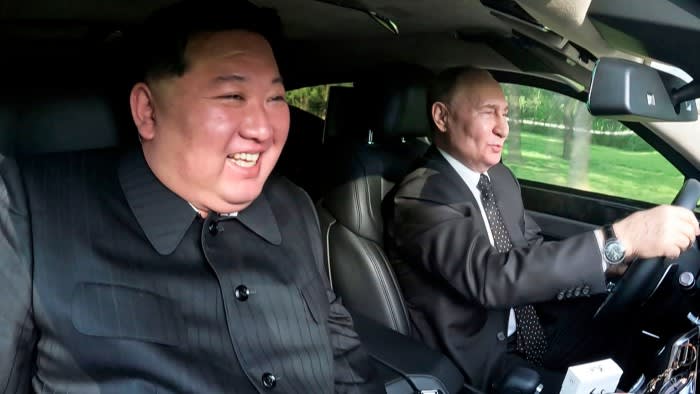In an article on Vladimir Putin’s recent visit to North Korea, China’s state-owned Xinhua news agency proclaimed that the trip must have “touched a raw nerve” in Washington.
What the Chinese propaganda mouthpiece naturally omitted was how Putin’s get-together with Kim Jong Un, which sealed a mutual defence assistance deal, must have irked another big capital: Beijing.
President Xi Jinping has been warily watching for months as two important, if difficult, partners have drawn closer, with Pyongyang supplying Moscow with much-needed ammunition for its invasion of Ukraine in exchange for promises of better military technology.
Publicly, China has refrained from any criticism. But signs of discomfort are rising. In April, Xi dispatched the most senior Chinese Communist party figure to visit North Korea in five years to reassert the two sides’ “deep friendship”.
Analysts believe China is concerned that Kim’s deepening ties with Putin could increase his sense of independence from Beijing. If emboldened, the North Korean dictator could engage in more missile tests that threaten to destabilise an already tense region.
Putin’s latest visit will do nothing to allay such concerns. The Russian and North Korean leaders signed a “Treaty on Comprehensive Strategic Partnership”, which pledges immediate military and other assistance “by all of one’s means available” in the event of an attack, according to an NK News translation.
The problem for China, said Shen Dingli, a Chinese professor of international studies, was that Beijing and Pyongyang had their own mutual defence agreement in the “Treaty on Friendship, Co-operation and Mutual Assistance”, first signed in 1961.
This would mean if Pyongyang felt treaty-bound to become involved in one of Russia’s wars — such as the invasion of Ukraine — Moscow’s enemies could strike North Korea. That in turn might trigger Beijing and Pyongyang’s mutual defence treaty, putting China on the spot.
“North Korea has unnecessarily put China in a very dangerous situation,” Shen said.
Other scholars are more sanguine, stressing the Sino-North Korean treaty was signed decades ago and Beijing’s interpretation of it has evolved. Ren Xiao, a professor at Fudan University’s Institute of International Studies, said the pact for China “does not mean automatic military involvement in any conflict on the Korean peninsula”.
China and North Korea’s bilateral relationship has long been testy, prompting some analysts in the past to label them “bitter allies”. Pyongyang regularly launches military provocations against its neighbours, causing dismay in Beijing by upsetting regional stability.
The language of the Russian-North Korean treaty may have also been vague enough to give both sides leeway. During the Soviet era, the two countries also had a mutual defence agreement but it was never invoked despite several relevant clashes and eventually lapsed.
“The caveat is what would constitute assistance,” said Yun Sun, director of the China programme at the Stimson Center, a think-tank in Washington. “So it seems that they left that pretty blurry.”
All of that leaves the question of why Kim and Putin, who is more dependent than ever on Xi, might risk annoying their powerful partner.
Shen suggested they might feel that China has not helped them enough — Putin would like more from China than just dual-use technology to assist his war in Ukraine and wants Beijing to buy more Russian gas.
Kim, for his part, might believe that Beijing is not providing his regime with enough support against the US and its allies. When Chinese, Japanese and South Korean leaders talked about denuclearisation of the Korean peninsula at a trilateral summit last month, Pyongyang denounced the discussion as a “grave political provocation”.
Kim also called Russia North Korea’s “most honest friend” during Putin’s recent visit — an implicit dig at China that has echoes of Pyongyang’s skill for playing off Beijing and Moscow during the cold war. Both leaders were eager to demonstrate that they had more friends than just Beijing.
Few expect any visible protests from Beijing. It still wants to keep its distance from some sort of tripartite strategic arrangement with the two rogue nations.
In a hint at Beijing’s frustration, Xinhua was dismissive of North Korea’s potential trade contribution to Russia. North Korea “cannot provide a prominent impetus for Russia to get out of its economic difficulties in the short term”, wrote Xinhua.
It left unsaid that when it came to economic support, China was virtually the only game in town for Putin.
For Xi, who boasts of his personal rapport with Putin, the episode is a reminder that friendship counts for little in statecraft, even a “no limits” partnership like the one China claims to have with Russia.
Source: Financial Times







